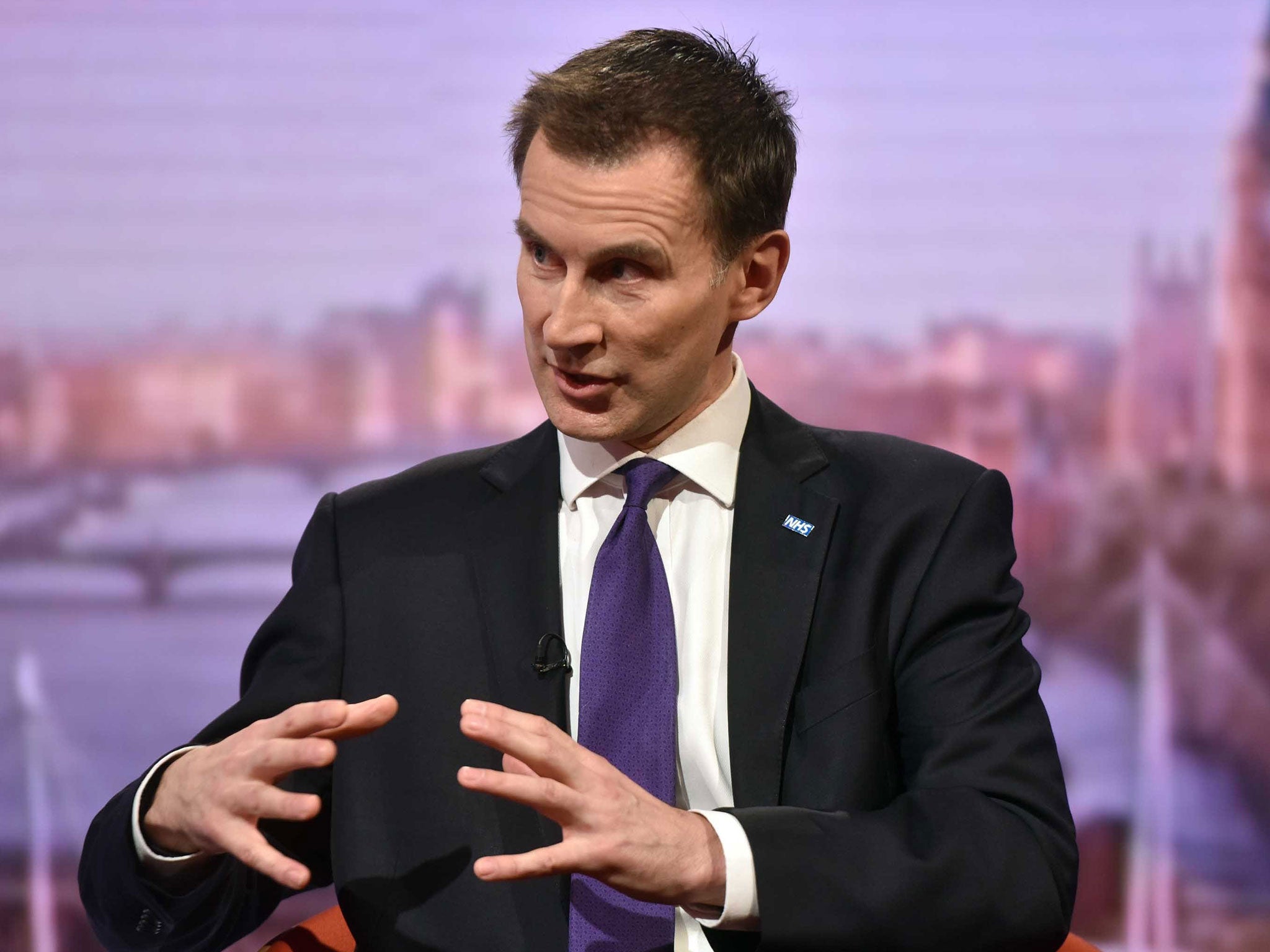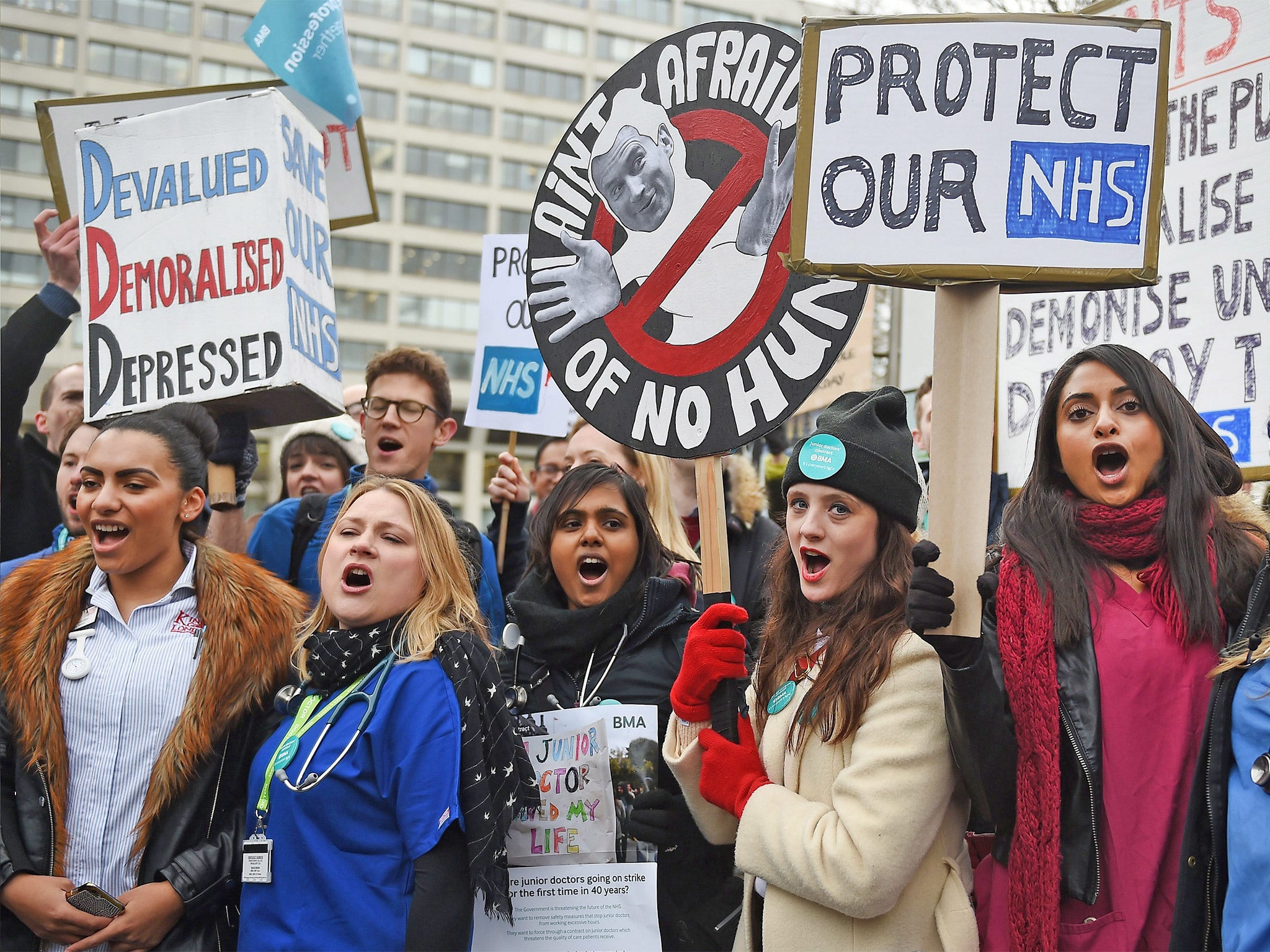'Hunt effect' could be driving up weekend mortality by scaring ill patients into delaying hospital admission - study
A study carried out last year found several cases, including two where patients died, of people who delayed seeking treatment because of concerns over the Health Secretary's comments

Your support helps us to tell the story
From reproductive rights to climate change to Big Tech, The Independent is on the ground when the story is developing. Whether it's investigating the financials of Elon Musk's pro-Trump PAC or producing our latest documentary, 'The A Word', which shines a light on the American women fighting for reproductive rights, we know how important it is to parse out the facts from the messaging.
At such a critical moment in US history, we need reporters on the ground. Your donation allows us to keep sending journalists to speak to both sides of the story.
The Independent is trusted by Americans across the entire political spectrum. And unlike many other quality news outlets, we choose not to lock Americans out of our reporting and analysis with paywalls. We believe quality journalism should be available to everyone, paid for by those who can afford it.
Your support makes all the difference.Critics of proposed changes to junior doctors’ contracts are highlighting the so-called “Hunt effect” that could be putting patients at risk by discouraging them from going to hospital.
Defending the Government’s intention to impose the new contract in Parliament today, the Health Secretary said eight independent studies in five years had found higher mortality rates at weekends.
“Six of those say staffing levels are a factor that needs to be investigated," he added.
"Professor Sir Bruce Keogh describes the status quo as ‘an avoidable weekend effect which if addressed could save lives’ and has set out the 10 clinical standards necessary to remedy this.
“Today we are taking one important step necessary to make this possible.”
The new terms, which will come into force for junior doctors in England this August, classify Saturday as a normal working day and extend “social” hours to cut those awarded extra pay.
Jeremy Hunt has argued that the change will make hospitals safer by increasing staffing levels at weekends and “deliver safer services across all seven days”.
But previous research found that the Health Secretary himself might have himself put patients in danger by alleging that weekend admissions were more dangerous.
“Around 6,000 people lose their lives every year because we do not have a proper 7-day service in hospitals,” he claimed last year.
“You are 15 per cent more likely to die if you are admitted on a Sunday compared to being admitted on a Wednesday…I have yet to meet a consultant who would be happy for their own family to be admitted on a weekend.”

In response to his comments, paediatricians Hoong-Wei Gan and Constantinos Kanaris carried out their own study after encountering anecdotal evidence of patients avoiding A&E and out-of-hours GP services after being frightened by the Health Secretary’s comments.
In a letter to the British Medical Journal (BMJ), where the previous research on weekend mortality was published, they said: “Misinterpretation and public statements by various members of the government including the Secretary of State for Health, the Rt. Hon. Jeremy Hunt, blaming the ‘weekend effect’ firstly on a lack of consultants, then junior doctors has been associated with a significant number of patients delaying their presentations to frontline services such as A&E and out-of-hours GP surgeries, based on the misconstrued belief that there is a lack of doctors over the weekend and they are more likely to die as a result of this.”
They conducted a national survey in October to determine the impact of the “Hunt effect”, which they defined as people delaying seeking treatment until a weekday despite, being ill, because of concerns sparked by the Conservative MP’s statements.
Out of 40 cases analysed, the vast majority had symptoms appearing just before or over the weekend but 85 per cent did not attend A&E or see their GP until the following Monday or Tuesday.

Two deaths were reported as a result of the delay and a third of people suffered “long-term, irreversible morbidity” in surveyed cases involving intensive care, surgery, psychiatry, medicine, child health and obstetrics and gynaecology.
The majority of doctors reported the impact of the delayed presentation as being major (40 per cent) significant (30 per cent) or life/limb-threatening (15 per cent).
More than half of the doctors questioned said the patients involved would have required shorter hospital admissions if they had sought treatment straight away and almost a third said no admission would have been needed at all.
“Although this study, like the study by Freemantle et al. cannot definitively prove causality, it is concerning that there is an association between Mr Hunt’s comments in July and October 2015 about the apparent lack of a 24/7 NHS and an increasing number of patients not presenting to frontline services in a timely manner, thereby affecting their clinical outcomes and ultimately jeopardising their safety,” the study concluded.
“Voluntarily reported surveys will by nature under-report cases, but extrapolation of this data would already indicate that at least 1000 patients could potentially come to harm as a result of this misconception per year, and this is based on our estimates before the peak winter season.”
Fiona Godlee, editor of the BMJ, separately wrote to Mr Hunt with concerns he had “misrepresented” an article on weekend mortality and inferred that the deaths were avoidable, when the study did not make that clear.
Announcing that the Government would enforce the new contract just a day after junior doctors walked out on a second strike, Mr Hunt said he could not ignore “evidence that hospital mortality rates are higher at the weekend, or the overwhelming consensus that the standard of weekend services is too low, with insufficient senior clinical decision-makers”.
But the British Medical Association (BMA) has argued that the changes will make doctors work “dangerously long hours” and effectively cut their pay, and warned that enforcing them could prompt an exodus of young doctors from England's NHS.
A spokesperson for the Department of Health said: A Department of Health spokesperson said: “The public should not delay accessing services if they need them.
"However, there is clear independent clinical evidence that standards of care are not uniform across the week and this Government makes no apology for tackling the problem to make sure all patients receive the same high quality care seven days a week.”
Join our commenting forum
Join thought-provoking conversations, follow other Independent readers and see their replies
Comments